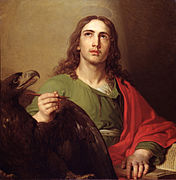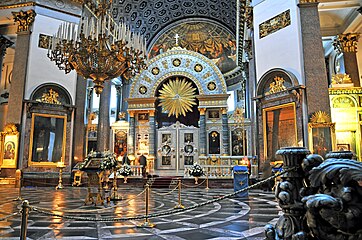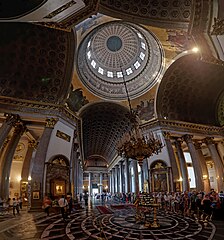| Kazan Cathedral Казанский кафедральный собор Kazanskiy kafyedral'nyy sobor | |
|---|---|
 Kazan Cathedral Kazan Cathedral | |
| Religion | |
| Affiliation | Russian Orthodox |
| Location | |
| Location | Nevsky Prospect 25, Saint Petersburg |
| Architecture | |
| Architect(s) | Andrey Voronikhin |
| Style | Empire |
| Completed | 1811 |
| Specifications | |
| Length | 82.5 m (NS-WE interior) 90 m (exterior-stairs) |
| Width | 86 m (exterior-stairs) |
| Interior area | 4,000 m (interior) 6,200 m (exterior) |
| Height (max) | 71.6 m (top cross) |
| Website | |
| kazansky-spb | |



Kazan Cathedral or Kazanskiy Kafedralniy Sobor (Russian: Казанский кафедральный собор, romanized: Kazanskiy kafedral'nyy sobor), also known as the Cathedral of Our Lady of Kazan, is a cathedral of the Russian Orthodox Church on the Nevsky Prospekt in Saint Petersburg. It is dedicated to Our Lady of Kazan, one of the most venerated icons in Russia.
Background
Construction of the cathedral started in 1801 and continued for ten years under the supervision of Alexander Sergeyevich Stroganov. Upon its completion in 1811, the new church replaced the Church of Nativity of the Theotokos, which was disassembled when the Kazan Cathedral was consecrated.
The architect Andrey Voronikhin modelled the building on St. Peter's Basilica in Rome. Some art historians assert that Emperor Paul (reigned 1796–1801) intended to build a similar church on the other side of Nevsky Prospect that would mirror the Kazan Cathedral, but such plans failed to materialize. Although the Russian Orthodox Church strongly disapproved of the plans to create a replica of a Catholic basilica in Russia's then capital, several courtiers supported Voronikhin's Empire Style design.
After Napoleon invaded Russia (1812) and the commander-in-chief General Mikhail Kutuzov asked Our Lady of Kazan for help, the church's purpose altered. The Patriotic War over, Russians saw the cathedral primarily as a memorial to their victory over Napoleon. Kutuzov himself was interred in the cathedral in 1813; and Alexander Pushkin wrote celebrated lines meditating over his sepulchre. In 1815 keys to seventeen cities and eight fortresses were brought by the victorious Russian army from Europe and placed in the cathedral's sacristy. In 1837, Boris Orlovsky designed two bronze statues of Kutuzov and of Barclay de Tolly which stand in front of the cathedral.

In 1876 the Kazan demonstration, the first political demonstration in Russia, took place in front of the church. It later became a focal point of student demonstrations against the Tsarist autocracy, following the self-immolation of Maria Vetrova in 1897. After the Russian Revolution of 1917 the authorities closed the cathedral (January 1932). In November 1932 it reopened as the pro-Marxist "Museum of the History of Religion and Atheism". or, as one contemporary writer put it, "Leningrad's largest antireligious museum", complete with Spanish Inquisition waxworks. Services resumed in 1992, and four years later the cathedral was returned to the Russian Orthodox Church. As of 2017 it functions as the mother cathedral of the metropolis of St. Petersburg.
The cathedral's interior, with its numerous columns, echoes the exterior colonnade and is reminiscent of a palatial hall, being 69 metres in length and 62 metres in height. The interior features numerous sculptures and icons created by the best Russian artists of the day. A wrought-iron grille separating the cathedral from a small square behind it is sometimes cited as one of the finest ever constructed.
The cathedral's huge bronze doors are one of four copies of the original doors of the Baptistery in Florence, Italy (the other three are at Grace Cathedral in San Francisco, United States, at the Nelson-Atkins Museum of Art in Kansas City, United States, and at the Florence Baptistery itself).
The Kazan Cathedral is considered to be the model for the neoclassical style of Helsinki Cathedral, one of the most iconic landmarks of Helsinki, Finland.
Iconostasis
The royal doors of the central iconostasis contain 6 paintings, each of them depicting a different biblical character. The left door contains the portraits of St Luke the Evangelist, the Archangel Gabriel and St Matthew the Evangelist. The right door depicts St Mark the Evangelist, the Virgin Mary and St John the Evangelist. They were painted by Vladimir Borovikovsky.
- Left door
-
 St Luke the Evangelist
St Luke the Evangelist
-
 The Archangel Gabriel from the Annunciation
The Archangel Gabriel from the Annunciation
-
 St Matthew the Evangelist
St Matthew the Evangelist
- Right door
-
 St Mark the Evangelist
St Mark the Evangelist
-
 The Virgin Mary from the Annunciation
The Virgin Mary from the Annunciation
-
 St John the Evangelist
St John the Evangelist
Gallery
-
 Exterior of Kazan Cathedral
Exterior of Kazan Cathedral
-
 Detail of cross
Detail of cross
-
 Side view of cathedral
Side view of cathedral
-
 Main view of the iconostasis
Main view of the iconostasis
-
 St Catherine of Alexandria by Vladimir Borovikovsky
St Catherine of Alexandria by Vladimir Borovikovsky
-
 Grave of Mikhail Kutuzov
Grave of Mikhail Kutuzov
-
 Main dome
Main dome
See also
- List of tallest domes
- List of largest Eastern Orthodox church buildings
- Our Lady of Kazan
- Kazan Cathedral, Moscow
References
- Nave & Altar & Three Narthex & Three Porches= 4,000 m.
Colonnade (inner courtyard) ~ 1,600 m.
Stairs ~ 600 m. - ^ Koeppe & Giusti 2008, p. 352.
- ^ "Kazan Cathedral". saint-petersburg.com. Retrieved 8 November 2011.
- Shulyatikov, Vladimir (16 March 2010). "Мария Ветрова в памяти поколений" [Maria Vetrova in the memory of generations]. Gorodnya (in Russian). Archived from the original on 8 January 2021. Retrieved 10 January 2024.
- For a perspicacious account of the "Museum" written a few years before the fall of Soviet communism, see https://query.nytimes.com/gst/fullpage.html?res=9B0DE0D9163BF930A1575BC0A961948260 (retrieved 2008 January 28)
- Capote, Truman (2007). Portraits and Observations: The Essays of Truman Capote. p. 153. ISBN 9780812978919.
- Klimov, Evgeny. "Русское искусство в эпоху Пушкина".
- Л. А. Баранова, В. М. Саблин. "Ансамбль Казанского собора". Ограды Санкт-Петребурга.
- Kirkko Helsingissä, Finnish Evangelic-Lutheran Church. "Cathedral".
Sources
- Koeppe, Wolfram; Giusti, Anna Maria, eds. (2008). Art of the royal court: treasures in Pietre Dure from the palaces of Europe. Michigan: Metropolitan Museum of Art. p. 352. ISBN 978-0300136722.
External links
![]() Media related to Kazan Cathedral, Saint Petersburg at Wikimedia Commons
Media related to Kazan Cathedral, Saint Petersburg at Wikimedia Commons
| Saint Petersburg | |
|---|---|
| General topics | |
| Geography | |
| Society and culture | |
| Government | |
| Emergency services | |
| Education | |
| Transportation | |
59°56′03″N 30°19′28″E / 59.9343°N 30.3245°E / 59.9343; 30.3245
Categories:- Churches completed in 1811
- Cathedrals in Saint Petersburg
- Defunct museums in Russia
- Russian Orthodox cathedrals in Russia
- Tourist attractions in Saint Petersburg
- Nevsky Prospekt
- Andrey Voronikhin buildings
- Auguste de Montferrand buildings and structures
- Vasily Stasov buildings and structures
- Church buildings with domes
- Cultural heritage monuments of federal significance in Saint Petersburg
- Neoclassical church buildings in Russia